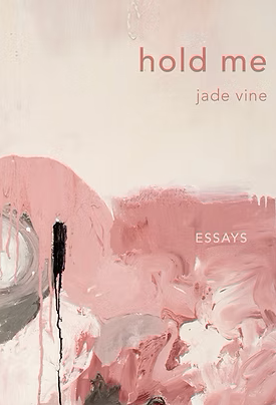by mk zariel

jade vine’s unsent texts pile up like repressed memories–the self-proclaimed poet and gender vandalist describing absence as an overgrown plant taking root in its throat, framing desire as a horrific monster. Admitting that “i’m most afraid when no one’s touching me or thinking of touching me” (75), these one-line messages all paint a dimly lit portrait of longing for care, for the warmth of feeling yourself desired by others, and yet fearing the experience of desiring. Yet every text still ends in “a love story,” self-referential and full of painful and irreconcilable emotion to the last.
hold me, a collection of lyric essays by poet, essayist, and trans anarchist jade vine (it/its), out in November 2024 in collaboration with queer-insurrectionary publishing house Split/Lip Press, is a strikingly vulnerable yet fierce reflection on queer desire and how it manifests physically. With each essay focusing on a different vignette from the author’s life, such as interactions with its nuclear family, romantic desires, self-discovery and radicalization around queerness, and simply the experience of living in an unruly trans body, this text is unlike a traditional poetry collection in that it does not focus on any specific vignette or motif. Instead, the connecting thread between the essays is love itself, the craving to be held, and the insurgence of needing care.
vine’s dedication — “If you ever woke up / in the middle of the night / and prayed to a god/ you didn’t believe in, / this is for you” — is not to a mentor or friend but to vulnerability and contradiction. The text only grows more emotionally driven from there. It writes about sharing food with its lesbian lover among mysteriously intoxicating and potentially symbolic blue flowers, about its catastrophic teenage crushes, about crying to its mother over their shared mental health struggles, about staring at the moon and feeling it looking back. It addresses itself solely by the name of its astrological sign. It fears being alone. It confesses to being melodramatic in conversation. It feels isolated in Delhi yet is even more alienated by the anti-queer bias in its hometown of Chandigarh, India. Moving deftly between the quotidian details of its life, the awkward messages on dating apps, the memorized poetry and mythology, the homophobic microaggressions and scientific articles, to the furthest reaches of desire, vine lays bare the desires that most of its audience feels yet represses. Near the halfway point of the book, vine asks its lover to feel desire as primal as the nature that surrounds them: “Leave the windows open. Let the rain come in. Let the jasmine fill the air. Let me hear the trees moan as I do” (53).
References to the physical and sensory realms of experience permeate and define vine’s intimately queer lyric essays. From the titular desire to be held to every experience of nature, such as the transcendent belonging the vine feels while watching the moon, the vine’s poetry dwells within the somatic side of trans existence. However, despite having no explicit connection to anarchist social movements beyond, of course, the inherent queerness of anarchy, the intrinsic anarchy of queerness, and the inextricability of everything beautifully transgressive, the poetry within hold me echoes a recent tendency in anarchist organizing toward the somatic. Starting with a viral Instagram post in the spring and summer of 2024 suggesting somatic practices such as mindful breathing, shared experiences of stim, and intuitive exercise for student organizers holding encampments in solidarity with the people of Gaza, the anarchist community quickly took on the practice of checking in with embodiment before focusing on intellectuality and theory.
Even within the anarchist scene of the Great Lakes region, admittedly a tiny and contentious one, I have been to countless events focused solely on caring for and healing our queer bodies–learning where we carry the trauma of witnessing and hearing about hierarchy and control, releasing it together, and despite the often painful nature of our work, feeling held. Amidst the many tragedies that our current political climate has brought, many of us are desperately burnt out, trying to respond to every crisis and finding that we are human rather than infallible, that we are limited. Maybe as a movement and community, we would do better to be open about our need to be desired, loved, and emotionally held.
The second half of hold me is appropriate to our present moment, full of desperation. vine prays to a god it doesn’t believe in, as it did in the dedication — ”Everything beautiful is in your image. And I cannot look away from you. I do not want to. Let me. Allow me. Honour me by honouring yourself. From here on out, I can only love you more. All the more” (71) — using religious imagery as a proxy for the boundless universal love that, despite every hardship or perhaps because of them, stays with it. It speaks of a desire to look away. It writes an obituary for a nameless trans friend. Like many of us, it confesses to still feeling passion, being enraptured. It feels broken by the world and its desires–and by the end, it announces it cannot look away anymore. vine is not revolutionary in the rabble-rousing sense of an Emma Goldman or Voltairine De Cleyre figure, urging its audience to action. Instead, it advocates for self-awareness, physical presence, and openness about somatic needs. Living under the trauma of statism, we could all do with a reminder that caring for the world entails caring for one another, or in vine’s world, a love story in an unsent text.
mk zariel (it/its) is a transmasculine poet, theater artist, movement journalist, & insurrectionary anarchist. it is fueled by folk-punk, Emma Goldman, and existential dread. it can be found online at linktr.ee/mkzariel, creating conflictually queer-anarchic spaces, and being mildly feral in the great lakes region. it is kinda gay ngl.



Add your first comment to this post